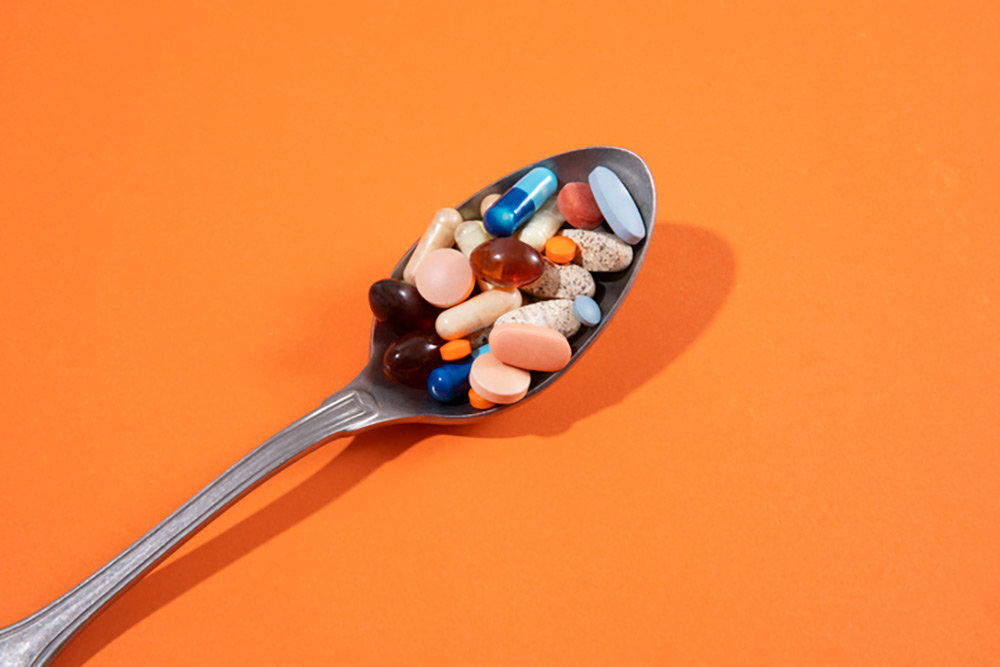
iStock
By Mary Carpenter
THE SUPPLEMENT wars continue—intertwined with the diet wars—from the potential toxicity of turmeric to ever-changing recommendations on Vitamin D, to why not just drink apple cider vinegar every day. Meanwhile, what may be the biggest questions concern whether particular supplements contain the ingredients listed on the labels—or not; or worse, may be dangerous to the health.
Recently, so-called Ozempic dupes are the latest iteration of weight-loss supplements—notably those from Kourtney Kardashian’s company Lemme, gummies called GLP-1 Daily, touted to suppress cravings and lead to weight loss. According to Harvard Medical School diet expert Pieter Cohen, however, the studies Lemme cites to support the supplements are “not credible.”
“Increased mortality rates” were among the effects of large doses of beta-carotene, selenium and vitamins A, C and E in some randomized research studies, writes Anahad O’Connor in the Washington Post. Dangerous side effects likely occur when supplements use the same metabolic pathways as medications: for example, Vitamin C can interact with statins and estrogen. According to O’Connor, “dietary supplements account for about 20 percent of drug-induced liver injuries nationwide.”
Liver toxicity can be a direct result of drugs, such as acetaminophen, that are intrinsically toxic to the liver. But the alternative, idiosyncratic toxicity, varies with gender, age and immune status of different individuals and is not dose-dependent. Women are more prone to drug-induced liver injury, as are African Americans.
Turmeric—taken in concentrated supplement form for purported anti-inflammatory and antimicrobial properties, and notably for arthritis—has caused liver damage. Early blood tests in one study barely detected two grams of turmeric’s healthful ingredient, curcumin—until adding black pepper, included in many turmeric supplements, boosted its bioavailability, the amount reaching the bloodstream, by 2,000%, according to the Post.
“Based on what we’re seeing in our data, [turmeric] is one of the most common causes of dietary supplement liver injury,” NIH director of liver disease research Jay Hoofnagle told the Post. Consuming about half a teaspoon of ground turmeric daily led to elevated bilirubin, indicative of liver dysfunction, in a 66-year-old woman seen in a Baltimore ER. Baltimore internist Fadi Alghzawi recently reported an uptick in turmeric-related liver cases and advises avoiding turmeric supplements altogether.
On Vitamin D, updated 2024 guidelines from the Endocrine Society include the caveat that “the optimal dose . . . isn’t known.” The guidelines advise against routine testing for Vitamin D levels in healthy individuals—and oppose supplementation beyond the daily recommended intake for adults younger than 75 years old, in the absence of osteoporosis. The daily recommended intake is 600 Iu/d (international units/day) through age 70; and 800 for those over age 70.
“We have no data that there’s anything about [Vitamin D] screening that allows us to improve quality of life,” Maine internist and moderator on a recent Endocrine Society panel Clifford J. Rosen told Medscape. And Harvard internist and chair of the panel Marie Demay noted “the paucity of data regarding . . . optimal intake of vitamin D for preventing specific diseases”—but acknowledged that “there are certain populations that will likely benefit from [higher] levels.”
Finally, apple cider vinegar (ACV) may offer advantages similar to those of supplements—notably, Vitamin B and antioxidants—and “is generally harmless as long as you use it correctly,” according to WebMD. Potential health benefits include helping reduce blood sugar levels and aiding weight loss, and many people tout effects, such as quelling inflammation.
But “the Internet would have you believe apple cider vinegar is the new pixie dust due to its health benefits,” according to University of Chicago researchers. “ACV is not pixie dust, but it’s also not snake oil.”Among drawbacks, it may exacerbate acid reflux, and can erode teeth enamel although the effect can be allayed by drinking water afterwards.
In previous years, the medical community contended that healthy eating supplied sufficient daily vitamins —but based on a study last year, doctors now recommend a daily multivitamin to slow memory loss in patients age 60 and older. Multivitamins, however, carry the same risks of all supplements, that ingredients are not officially monitored.
Voluntary testing programs offered by two organizations offer certifications for purity and potency—and supplements that meet these standards earn listings on the sites and can display the programs’ logos: either the black and yellow “USP Verified” or the blue and white “NSF” (National Sanitation Foundation). Among highly rated multivitamins, however, Centrum products display no logo, while Nature Made has NSF boldly printed on its labels.
Discussing supplements with your doctor can be a good way to choose a reliable brand—although mine had none when she recommended a multivitamin based on last year’s study. I ended up choosing Centrum only because a friend gave me her supply; she had discovered the pills contained iron and didn’t want the risk of constipation.
Iron has also been a troublesome supplement for me. Years ago, my doctor urged me to take it for low ferritin, a protein that stores and releases iron to help replace what’s lost in the course of daily bodily functions, such as sweating and sloughing off skin cells. But for three years, the “gentle” iron she recommended–specifically to avoid the same risk of constipation—had no effect. Finally, a different doctor who is a high-school friend told me the only effective brand to increase ferritin is FeroSul. After taking it, my levels shot way up to normal by the next testing.
These and other confounding experiences have made me wary about adding any new supplements—despite the enthusiasm of friends for potions containing mushroom powders and anti-aging remedies, as well as for the multitude of gummies, lollipops and other formulations from Kourtney Kardashian’s Lemme.
—Mary Carpenter regularly reports on topical subjects in health and medicine.

PreserVision and similar ‘eye’ vitamin supplements are for the moment about all we have to fight dry age-related macular generation, which is usually inherited and progresses with smoking. In clinical trials that is a supplement considered to be effective.